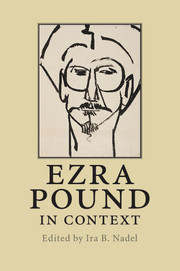Book contents
- Frontmatter
- Contents
- Notes on contributors
- Acknowledgements
- Chronology
- List of abbreviations and note on references to The Cantos
- Introduction
- Part I Biography and works
- Part II Historical and cultural context
- 16 The classics
- 17 Provençal and the troubadours
- 18 Dante and early Italian poetry
- 19 America
- 20 Venice
- 21 London
- 22 Paris
- 23 Rapallo and Rome
- 24 Pisa
- 25 Imagism
- 26 Vorticism
- 27 Music
- 28 Visual arts
- 29 Confucius
- 30 The Orient
- 31 Little magazines
- 32 Publishing and publishers
- 33 Modernism
- 34 Fascism
- 35 Anti-Semitism
- 36 Gender and sexuality
- 37 Race
- 38 Travel
- Part III Critical reception
- Further reading
- Index
34 - Fascism
Published online by Cambridge University Press: 05 July 2014
- Frontmatter
- Contents
- Notes on contributors
- Acknowledgements
- Chronology
- List of abbreviations and note on references to The Cantos
- Introduction
- Part I Biography and works
- Part II Historical and cultural context
- 16 The classics
- 17 Provençal and the troubadours
- 18 Dante and early Italian poetry
- 19 America
- 20 Venice
- 21 London
- 22 Paris
- 23 Rapallo and Rome
- 24 Pisa
- 25 Imagism
- 26 Vorticism
- 27 Music
- 28 Visual arts
- 29 Confucius
- 30 The Orient
- 31 Little magazines
- 32 Publishing and publishers
- 33 Modernism
- 34 Fascism
- 35 Anti-Semitism
- 36 Gender and sexuality
- 37 Race
- 38 Travel
- Part III Critical reception
- Further reading
- Index
Summary
Pound's fascism has long been controversial. One point of agreement among critics, both detractors and enthusiasts, is that Pound's idea of Italian fascism should be distinguished, at least in part, from its reality. As K. Ruthven stated, “Italian Fascism as a political practice, developed at a particular historical moment and in particular economic conditions, was related to Pound's ‘Fascism’ only by way of adjacency.” The “Mussolini” of Jefferson and/or Mussolini was “a figment of Pound's imagination, the heroic agent of a ‘fascism’ as remote from Italian Fascism as ‘Mussolini’ was from Mussolini.”
The difficulty encountered by early Pound scholars in coping with this issue led to the creation of a divided image, as if the poet who helped create modernism were one thing, and the fascist who broadcasted in favor of Mussolini were another. Studies carried out from the late seventies on helped recompose the fracture, demonstrating that Pound's poetry cannot be separated from his political beliefs.
A common assumption has been that Pound came to fascism via economics, and that his adherence was motivated by a thorough examination of Mussolini’s programs in the light of guild socialism. But as recent studies have pointed out, the emergence of Pound’s interest in fascism seems less indebted to economic theory than to the poet’s aesthetic concerns. The economic element was undeniably important, but it seems to have come in late. Pound’s enthusiasm for Mussolini was rather rooted in his concern with the role of the artist in modern society and essentially bound to the project of his epic.
- Type
- Chapter
- Information
- Ezra Pound in Context , pp. 376 - 390Publisher: Cambridge University PressPrint publication year: 2010

